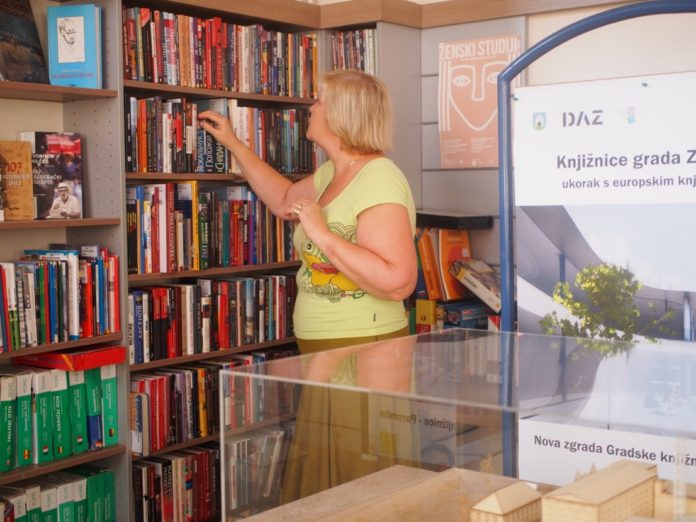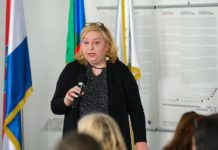There are currently ten central libraries of national minorities in Croatia and they function within the network of public libraries in different cities. Such library material enables members of minorities to use their language and script, that is to access information in their mother tongue. The role of these libraries is very important, inter alia, to preserve the cultural identity of minority group members. On the other hand, library material also includes books in other languages, the language of the majority population – Croatian and in English, which enables other citizens to find out more about the tradition, culture and way of life of their minority fellow citizens.
Katarina Todorcev Hlača is the Head of the Rusyn and Ukrainian Central Library of the Republic of Croatia, located in the City Library in Zagreb. She is from Ukraine where Russian language was spoken, so Ukrainian and Russian are her mother tongues, and since she has been living in Croatia for almost thirty years, she is very fluent in Croatian as well. In the pleasant library ambience we interviewed Katarina Todorcev Hlača.
How do you assess the organization where central libraries of national minorities function within the network of public libraries?
I would like to have one department where all central libraries of national minorities would be together. Such an organization would provide a better service to our users. Namely, our colleagues from the public library do not know much about the library material we have. If a user asks for a specific book they can find it in the library catalogue, but they cannot provide assistance if the user asks them to recommend the book of a particular subject. Our practice is that users request a book at the reference desk and later, when I am in the library, I prepare topical books for them. However this is not the most practical solution, because in such cases a person has to come back to pick the books and they lose their time, whereas I cannot be in the library twelve hours a day either because I have other work obligations, seminars and the like. If all minority libraries were integrated in the same department then a colleague could always fill in for another colleague and that way there would be someone at the users’ disposal at all times.
Joint department for libraries of national minorities is currently just an idea because meeting with architects has not taken place. Namely, reference documents should be completed by the year 2021 so that we can apply for European funds. Although the process is long, it is important to start.
Do you cooperate with other heads of central libraries of national minorities and do you undertake certain joint projects?
Since 2009, we have a Working Group bringing together all heads of ten libraries of national minorities located in different Croatian cities. Its work is organized under the Croatian Library Association bringing us all together in our activities. One of the upcoming events we are organizing is 3rdRound Table: Libraries for Others and Different to be held at the Serbian Central Library in Preradovićeva Street on November 15. We will present minority libraries’ projects and programmes intended for different groups of people, people with disabilities, immigrants, asylum seekers and anyone who wants to learn a language. Talking about other joint projects we have already organized an exhibition, wrote a guidebook and now we are in the process of launching a common web portal. I believe people would be more informed about the libraries of national minorities if all the information were available in one place. That way they would know how many central libraries of national minorities there are and where they can borrow a certain book.
Do the events organized by central libraries of national minorities attract significant media coverage?
Media coverage is not great, and this is one of the key reasons why we have decided to launch a common portal. This is an aspect that should be addressed. Aleksandar Tolnauer, President of the Council for National Minorities of the Republic of Croatia, also says that we do not receive broad media coverage. Our magazine is our own media activity, but it is read by certain people only. We publish various content, which is, of course, in Croatian language as well in order to attract a larger audience. I sometimes even publish a culinary recipe.
Is your library material written exclusively in the minorities’ language or do you have books in other languages as well?
Central libraries’ material is obtained in minorities’ languages from their home countries, however entire library material is not written in minority’s mother tongue only, there are also books in Croatian and English language. For example, if someone writes a study about the Ukrainians in Croatia and publishes it in English, we will also collect it for our material. People do not read in the languages of national minorities, so this way they obtain information about minorities in Croatian or English language, which contributes to the better inclusion of minority members in society.
Another important role of the central libraries of national minorities is the collection of different materials for their so-called regional collection, which is the material from the territory of Croatia as their present homeland. This collection is situated in a single location and includes everything published in respect of a particular national minority, such as publications by minority associations. This collection includes photos from the exhibitions and the entire archives documenting the organized events. The collection even includes clips from Prizma, multinational programme for minorities broadcast on HRT, but also the movies or some other recordings made on private occasions, the so-called ephemeral material that is also included in the collection. It is very important to gather all the data on a national minority from a certain area.
What if somebody wants to borrow a book from a certain central library of national minorities but that library is not situated in their town?
People are still not familiar with the term interlibrary borrowing, which is part of the practice of public libraries. For example, if someone is Bosnian, but does not live in Sisak where the Bosnian Central Library is located, they can borrow a book from that library in any other city in Croatia. The colleague responsible for the interlibrary borrowing sends a request to the library where the book is located and it will be delivered to the request city. Given the increasing digitization, there is already a large number of e-books available to people at all times.
Since you organize numerous events and workshops, what is the response?
It is easier for the libraries in smaller towns and cities because the library is the centre of cultural life there. When an event is being held in these libraries, for example a book presentation, a large number of residents are present. This is much more complicated in Zagreb because it is difficult to harmonize all the events. The day I ran an Easter egg–painting workshophere, in Preradović Street library there was the opening of an exhibition, and there were certainly plenty of other events in the city, which results in lesser response. So when I organize a workshop I like to invite a target group of people that might be interested in the workshop. I invite the pupils of the high school of applied arts and design when I organize a painting workshop, and when I organize a cooking workshop I invite a culinary association, and I also invite the retired people because they are always interested. Literary Friday, public lectures in libraries, proves smaller audience response since a couple hundred people used to attend it in the old building, and today everyone is busy, mostly in front of computers. We solved that digitalized situation by recording the Literary Friday and later we upload iton YouTube. Internet viewing figures show that interest exists, despite a smaller number of attendants.
Which are the most borrowed books?
Members of national minorities usually borrow the latest fiction, especially over the vacations, or some historical books. Besides, people who learn a new language often come to us. More often it was about the Russian rather than Ukrainian language because the Ukrainian Language and Literature University Program has been established later. We are also visited by generations born in Croatia whose relation to the language has only been within their families and they cannot read or write in that language. Central library also functions as a school library for schools with Model C education programme in minority languages where the minority language is offered as an elective course, therefore we provide them books not available elsewhere.
What kind of literature do you prefer?
When I have time, I like reading crime fiction. I would like to mention that lately in Ukraine there have been truly fantastic novel writers, besides those of crime fiction. Men mostly write political prose and crime fiction, but I would like to emphasize that women are increasingly affirming their position as authors of various novels about everyday life and interpersonal relationships. Until the independence of Ukraine I could only mention a few female writers, for example Lesya Ukrainka and Lina Kostenko.
Ukrainian literature is quite translated into other languages, among others in Croatian. For example, Yuriy Vynnychuk and Andrey Kurkov are well known in Europe. Thanks to the Embassy of Ukraine in Zagreb, Ukraine literature has been translated into Croatian language because we had one deputy chief of mission who was a writer himself. There is one European translation program for translating one small language into another small language. Here we are talking about languages spoken by a smaller group of people, and not about the world’s most famous languages, such as English, German, Italian, French and Russian, most learned and used. Thanks to this program, we have Croatian translations of several good novels.












